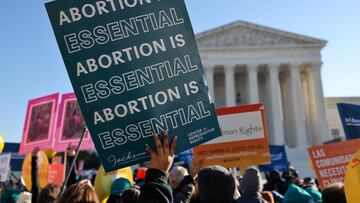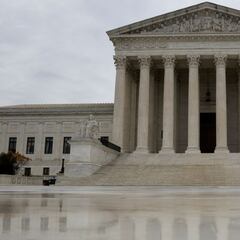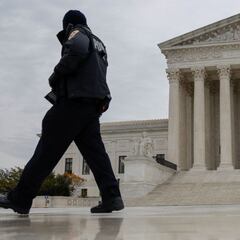What did Justice Brett Kavanaugh say in the Supreme Court abortion law hearing?
The first day of oral arguments saw a surprising admission from one of the conservative Justices, stating that he does not consider abortion a constitutional right.


The Supreme Court began hearing arguments on Wednesday in Dobbs v Jackson Women's Health, which looks set to be a landmark case for abortion rights in the United States.
Back in May the Court agreed to hear a challenge from the state of Mississippi which is attempting to introduce a new law that would ban the majority of abortions after 15 weeks of pregnancy. This goes against the precedent set in Roe v Wade (1973) and reaffirmed in Casey v Planned Parenthood (1992).
However in the opening hours of the hearing today, Justice Brett Kavanaugh shocked abortion rights groups by outlining his belief that there is no explicit constitutional right to abortion.
He said: “The Constitution is neither pro-life nor pro-choice ... and leaves the issue to the people to resolve in the democratic process.”
During his 2018 confirmation hearing, Justice Brett Kavanaugh declared that he considered Roe to be settled law, winning him the crucial support of Senator Susan Collins. A reversal by him would be politically explosive, says @hillhulse.
— The New York Times (@nytimes) December 1, 2021
Listen live: https://t.co/dPjpquzIgH
Kavanaugh appeared to argue that the Supreme Court should restrain from choosing sides in the matter, and suggested that he would be willing to allow individual states to introduce their own legislation regarding abortion practices. He finished that particular line of questioning by reading out a list of previous, unrelated, SCOTUS rulings which had subsequently been overturned by Justices.
Susan Collins believed Kavanaugh would uphold Roe v Wade
Brett Kavanaugh became the second Supreme Court Justice appointed by President Donald Trump in October 2018 and his confirmation was an extremely controversial one. The Trump nominee had to be confirmed by the Senate with the votes of at least 50 senators, but it required the vote of a key moderate Republican: Sen. Susan Collins.
Collins is a supporter of abortion rights and had pressed Kavanaugh for assurances on the future of Roe v Wade before agreeing to vote for his confirmation. Kavanaugh said that he considered Roe v Wade to be settled and even described it as an "important precedent" in his confirmation hearing.
Susan Collins during Kavanaugh’s 2018 confirmation proceedings: “We talked about whether he considered Roe to be settled law. He said that he agreed with what Justice Roberts said at his nomination hearing, in which he said that it was settled law.” https://t.co/xVNRbAXryy
— Manu Raju (@mkraju) December 1, 2021
At the time of Kavanaugh’s confirmation hearings Collins told reporters: “We talked about whether he considered Roe to be settled law. He said that he agreed with what Justice Roberts said at his nomination hearing, in which he said that it was settled law.”
However in recent months Collins has criticised the Supreme Court’s decision to allow the controversial Texas abortion ban to go into effect, ruling that the unusual ‘bounty’ implementation system could go into effect.
Related stories

What is Roe v Wade in law? What happened in 1973?

What is the Supreme Court what are its justices? Whats their role? Who chose them?
Collins did not mention Kavanaugh explicitly but slammed the Court’s conservative Justices who said that the law could stand, pending a ruling: “I oppose the Court’s decision to allow the law to remain in effect for now while these underlying constitutional and procedural questions are litigated.”
Follow all the latest news on the Supreme Court abortion hearing and the future for Roe v Wade with our dedicated live feed: Supreme Court on Roe v Wade: live updates